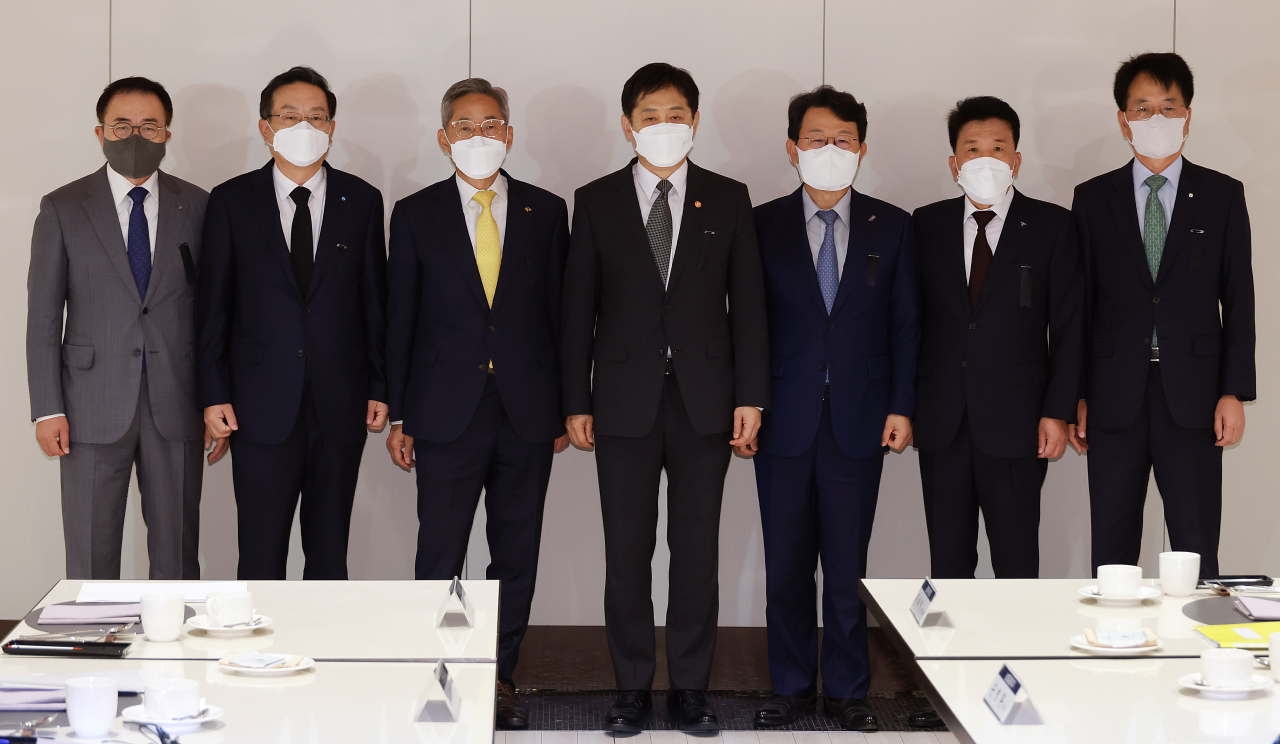Banking giants to inject W95tr to ease liquidity strain
By Choi Si-youngPublished : Nov. 1, 2022 - 18:23

The leaders of South Korea’s five banking giants on Tuesday agreed to provide 95 trillion won ($67 billion) in liquidity by year-end to shore up local financial markets, rocked by a recent credit default, in what many see as a response to the government’s request for the financial groups’ support.
Early in October, a state-backed local developer missed a bond payment, freezing bond and short-term money markets in a blow to market expectations for a government guarantee. The government scrambled to roll out an emergency liquidity program worth at least 50 trillion won, saying help from market participants, like the major lenders, would make the relief matter more.
The five chiefs -- from KB Financial, Shinhan Financial, Hana Financial, Woori Financial and NongHyup Financial Groups -- delivered a united front to the top financial regulator at Tuesday’s meeting, saying they expect to see market calm returning from injecting 12 trillion won for debt and stock markets and 73 trillion won for the wider financial market. Another 10 trillion won is set aside to manage liquidity at the groups’ affiliates, which include brokerages, insurance and card companies.
Chairman Kim Joo-hyun of the Financial Services Commission, the regulator, called the decision “two-way” because the financial institutions had already enjoyed benefits like a surge in loans, thanks in part to the loosened monetary policy put in place in the early days of the coronavirus pandemic to fight off its economic disruptions.
“These are the five financial institutions that markets respect and trust, and I believe they have roles to play and we will do our part helping them to do what they do,” Kim said, noting the banking giants should not leave behind small and medium-sized businesses along with ordinary Koreans facing bigger repayment burdens than before as borrowing costs surge.
The Bank of Korea -- also taking part in efforts to boost liquidity by making it easier for financial institutions to seek loans from the central bank -- has raised its policy rate to a 10-year high of 3 percent so far, with the terminal rate climbing to 3.5 percent by year-end on the most hawkish bets. Households became heavily indebted, with their debts making up 102.2 percent of the country’s gross domestic product as of the second quarter this year, according to the Institute of International Finance. That is the world’s highest among 35 major economies.
Higher borrowing costs also led households to reset their loan priorities, prompting a housing market slowdown. But how to prop up the housing sector is still a work in progress as Chairman Kim is wary of being specific about steps the agency plans to take so the market is headed for a “soft landing.” Last week, Kim briefed President Yoon Suk-yeol on his plans to partially ease mortgage rules.
At the Tuesday gathering, Kim expressed misgivings about a sweeping rule change, saying loosening the debt service burden, for example, was still premature. The metric, which measures borrowers’ income against their mortgage as well as nonmortgage debt, has been used to put the strongest curb on home buying.
“A soft landing is crucial for the property market,” Kim said. “But first, we have to look at regulations the Land Ministry has put in and taxes the Finance Ministry has enforced. For now, the bottom line is that we have to be extra careful when it comes to loosening that particular set of rules.”












![[Today’s K-pop] BTS pop-up event to come to Seoul](http://res.heraldm.com/phpwas/restmb_idxmake.php?idx=644&simg=/content/image/2024/04/17/20240417050734_0.jpg&u=)





![[KH Explains] Hyundai's full hybrid edge to pay off amid slow transition to pure EVs](http://res.heraldm.com/phpwas/restmb_idxmake.php?idx=652&simg=/content/image/2024/04/18/20240418050645_0.jpg&u=20240419100350)

